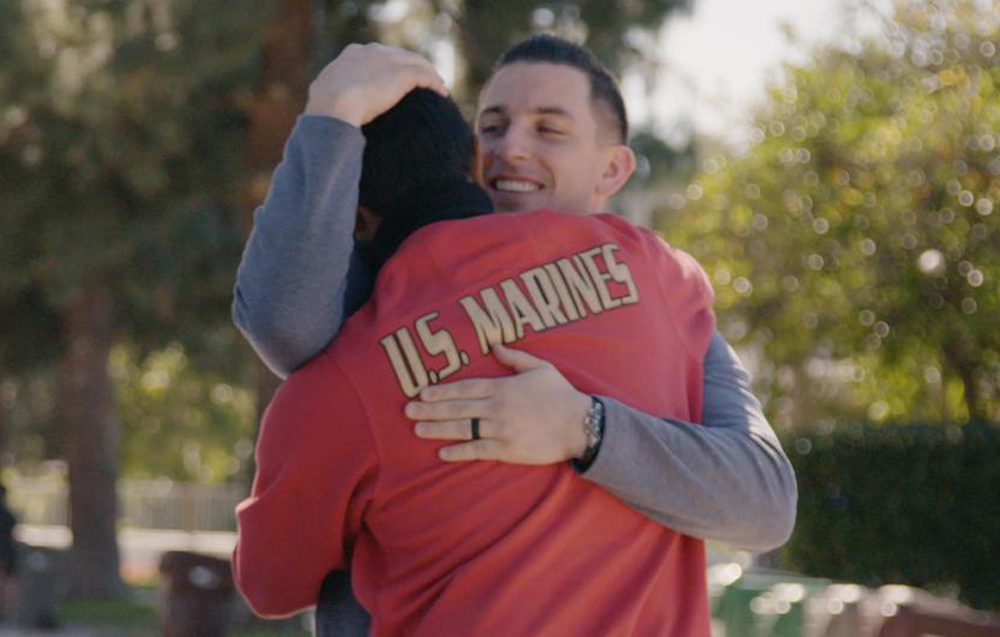Even though “American Sons” was built around the memory of J.V. Villarreal, a member of the U.S. Marine Corps who tragically didn’t return home from his service in Afghanistan, it is quite easy to believe he is still alive from his dispatches from the battlefield, enthusiastically describing all the parts of the military experience that were new to him as someone who spent his childhood in San Antonio. “It’d be nice to be done with the war shit, go to school, go do something better,” he admits as he shows off his barracks in the opening minutes of Andrew James Gonzales’ moving documentary, but he hasn’t lost his good spirits, surely boosting those around him in his unit that haven’t let him go after their own return home.
Villarreal can still be seen bringing together people as Gonzales meets with members of the India 3/12, who were tasked with guarding some of the most sensitive areas of Afghanistan after being stationed in the Kajaki District, after their tour of duty has ended, but the fight to carry on continues. As Corporal Angel Rios, one of the members of the platoon mentions, it has taken over a decade just to open up about what he experienced in combat and Gonzales and producer Laura Varela prepared themselves for the long haul, filming over the course of five years after being entrusted first with the footage Villarreal captured that was passed along by his sister April and his mother Yolanda and then with the other Marines’ stories. The way each have been affected by war is different – Corporal Ty Klinman longs to return to the battlefield when working at a family restaurant doesn’t compare, though his bouts with PTSD prevent being medically cleared for another tour while Staff Sergeant Andrew St. Cyr sets about checking in on everyone in the old unit to make sure they’re doing alright, reminded of the names of those he lost with a bracelet that never leaves his wrist.
The film powerfully conveys the harsh realities of war when it’s evident what Villarreal and his troops were willing to sacrifice for their country, but “American Sons” stresses the care that’s required after for veterans as they reenter civilian life, haunted by the idea that they made it back when their friends and fellow Marines might not have and elegantly shows how they now fight to keep up connections in a society they feel alienated from at large, gradually releasing their trauma as they can confide in one another and help each other reacclimate. After premiering earlier this spring at South By Southwest, the film is heading west to the L.A. Latino International Film Festival in Los Angeles and Gonzales and Varela graciously shared how their patience paid off with this compassionate portrait of Villarreal and all the lives he continues to impact with the legacy.
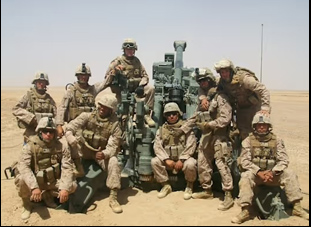 How did the two of you join forces on this?
How did the two of you join forces on this?
Laura Varela: Andrew and I have been working together for several years on several short docs and other projects and [“American Sons”] was originated from J.V.’s footage, which was brought to me by J.V.’s sister about a year or two after he passed away. She had seen another film that I had made on Chicanos and Vietnam in San Antonio [“As Long as I Remember: American Veteranos”] and how it affects you personally, your family and your community. She didn’t realize that I was in San Antonio. When she did, she looked me up and she came over to my office and had this thumb drive full of footage of J.V. Some of it was in formats that we couldn’t view yet, but there was a set of Getty photos from his deployment on the days before he passed away, the day he died, and the day after. So that immediately sparked our interest. I had told April [J.V.’s sister], “I don’t know how long this is going to take, but I promise you I’ll get this film done.”
Andrew James Gonzales: Just seeing the raw intimacy of these photos from his deployment was something that I had never seen before and it just appeared to me that these needed to be shown to the world. This footage needed to be shown to the world. This is a story that people needed to understand. And it still needed development. But it was very exciting to have these assets to develop into a way that we thought would be interesting and in our style of producing, we immediately just started connecting with all the people that surrounded J.V. and learned a little bit more about who he was, but also who they were. That’s when the story really came together.
Angel actually says in the film it took him nearly a decade to be able to even open up about his experience, given his trauma. Did you how how time would play into this?
Laura Varela: Yeah, it takes time to develop a story. It’s hard for all independent filmmakers to raise money, and sometimes it’s a blessing because you can see a story develop in the long term. You have to go and see what’s happening. April and Yolanda [J.V.’s mother] are very connected to the men — they call Yolanda “mom” now, and it’s become a new family, as you can see in the film. And it was through their connection and their trust that the men even started talking to us. They introduced us to the men. April would come with us to California on her first shoots and Tampa and many places right in San Antonio, and that’s how we were able to get some of the most intimate footage.
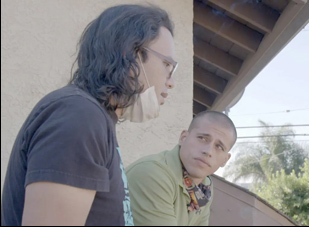 From working on the other film about Chicano Vietnam veterans, I also knew that you really needed to spend a lot of time with the veterans to just gain trust and friendship before you could even pull out the cameras and I really encouraged Andrew [in that direction], because Andrew is about the same age as J.V. would have been right now.
From working on the other film about Chicano Vietnam veterans, I also knew that you really needed to spend a lot of time with the veterans to just gain trust and friendship before you could even pull out the cameras and I really encouraged Andrew [in that direction], because Andrew is about the same age as J.V. would have been right now.
Andrew James Gonzales: I know my relationship with these guys was very much a brotherhood, just like the brotherhood that they had, where they would, if they didn’t want to film, they’d tell me, “Hey, I don’t want to film,” and I’m not taking it personal. I just [say], “Okay, let’s chill. Let’s do something else.” That experience of just being together really helped build that trust and helped us understand, “Okay, what else is going on? That makes this a story that can live on, that can have impact, that can help others. The crux of the whole thing was to try to understand and be curious about someone else’s lived experience. Then how can you help them to talk about that in a way that’s useful to them, in a way that’s meaningful, in a way that they can, their lived experience shared can be helpful for so many others that are perhaps going through the same thing.
As a first-time feature filmmaker, because I just didn’t understand how long it would take, I think my ego thought it was going to happen faster, and it didn’t, so that was a huge learning process for me. A lot of it has to do with the fundraising that you need to produce something of this scale. Even though it is an hour-long, we shot about 150 hours worth of footage in order to get that hour, so those periods where there was not enough funding to continue on, it gave us an opportunity to take a step back, try some different things and spend some time away just growing older and having life experience. And I think getting started, everybody has this idea that this is a celebration of J.V.’s life and his courage in combat. And it is. I’m really happy that when we finished, it truly was that. But it’s more than that.
Originally, everybody committed to that mission of celebrating him and that’s the ride that they were along for and what we were all along for. But of course, we want to know more about what’s going on in everybody’s personal life, like what’s it like to live after combat? What’s your personal experience like, having lost your friend? So you just start trying to understand [them] as humans, as Marines, as Americans, and the things that they tell you are so deep because the experience is. Through learning more about them, you realize that their story is just so emotional and dramatic at times. There’s laughter and tears and everything that has to do with the human experience, so it was just about going on that journey together.
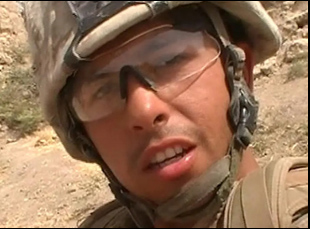 Was there anything specific that happened that took this in a direction you didn’t expect?
Was there anything specific that happened that took this in a direction you didn’t expect?
Laura Varela: Originally we had envisioned J.V. being woven throughout the whole film and we were going to be telling the story of the men healing together and getting better. What I was not expecting were the stories of J.V.’s last day and the story of Angel getting blown up. We talked to Sergeant Segura, who was with Angel Rios on the day he got blown up and we were able to follow up with Jonathan Eckert after the reunion, and that just changed the ending so much for the better. You’re not expecting these things, but it’s beautiful and it was meant to be and now it’s a very core part of the story.
Andrew James Gonzales: I heard this quote recently from Hitchcock that said, in narrative, the director is God. But in documentary, God is the director. That’s very true and what I learned is that you walk into something with courage and you have a mission and you know that you’re trying. You want to do something great and you don’t know exactly what it is. And the more you try to control it, the more it will be out of your control. So you have to submit to what’s happening — the good times and the bad — and you just have to know that in time, everything is just going to work out and you just have to be patient. That was just really key in terms of allowing the story to develop as it needed to be.
When you have the bedrock of this footage that was shot by J.V. and it’s in conversation with the present day footage that you’re capturing, did that come together structurally pretty easily or was it difficult to find the ins and outs?
Laura Varela: It was a delicate balance. It took a lot of time to even get it to a point where we could bring in editing consultants to see what we were thinking was the story and the structure. When we brought in Anne Lewis, our editing consultant and my longtime colleague, she really liked what we had, but she really started showing us the possibilities with interweaving [the narrative] to make it smoother and Andrew and I sat down and edited this for several months. Sometimes when you’re so close, you need that outside perspective to come in and just kind of give you a little nudges here and there. And Andrew did a really great job in terms of polishing it up and making it look nice, and [again] it was a happy accident, having these powerful recollections of the last days of J.V., the day he passed away and then also finding out really what happened to Angel Rios.
Andrew James Gonzales: We were always very clear on the opening and the end scene, and what those would be with J.V. bookending the film. In reality, even though he passed away during the original filming, he stays alive with you because he’s there at the beginning. You get to know him immediately and the film ends with him, so we always knew that was going to be that. Then we had the journey of working with multiple partners and that helped us say, “Okay, well, this isn’t so much the way we want to go” or it was very clear, “Oh, that is the way that we want to go,” so it let us know that sometimes we’re on the right path with our intuition in both directions.
A lot we were struggling with was that you want to experience watching somebody in one position and then see them transition to this successful state because we’re a bit tainted with Hollywood happy endings. That was a struggle trying to find a happy ending, but in the process of talking to so many veterans, both those in the film and those outside of the film that you’re consulting with, not all the time it is a happy ending and it’s important to show that things are still going to be challenging, but how are people dealing with it is really the journey that they’re on and sometimes life is beautiful because of the challenges. It’s beautiful because of the heartache and the appreciation for life [after] seeing the dark side of it. So I’m really happy with the way that came together and it could have been no other way. We just had to figure out what was going to happen in between [the beginning and the end] and that was a helpful guide throughout the whole process.
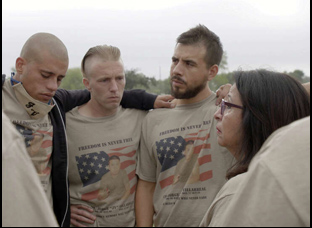 What’s it been like starting to share this with audiences?
What’s it been like starting to share this with audiences?
Laura Varela: It was quite an honor to have our world premiere at South by Southwest and the legitimacy that brings in the film world. And we won an audience award at the Houston Latino Film Festival and now we’re going to be showing at the Los Angeles International Latino Film Festival, so we’re just really excited. We’re also very happy that we have been supported this whole time by Latino Public Broadcasting, by Black Public Media and California Humanities. We wouldn’t be here without them. We believe in PBS and the power of independent filmmaking and journalism and we’re going to have our film premiere on PBS on the Voices series in January of 2026, so we’re just excited to get it out to a national audience. We really want a lot of people to see this film and we also want to have a lot of community dialogue.
Andrew James Gonzales: Yeah, it’s been awesome just being able to experience the film with audiences in different cities. When you’re making the film and it’s taking so long and people are asking you, “When’s your film going to come out?” You have to keep telling them, “Sometime next year or whatever,” and then you just keep working on it and then you get to the point where you’re getting closer to being done and the story’s feeling real good, but it still looks not [quite] right. But then when you get those finishing people in there — the colorist, the sound people and the music gets laid in — when you get to experience the film as is intended in the theater with an audience for the first time, a lot of times I’m looking around at what people’s body language is doing throughout the film. That part is awesome for me because I’ve seen the film a thousand times. I know when people are going to feel uncomfortable. I know when they’re going to laugh. I know when they’re going to cry. And it’s just an amazing experience to know that you’ve created something that’s making people feel something. It’s a wonderful, wonderful experience.
“American Sons” will screen at the L.A. Latino International Film Festival on May 31st at 3 pm at the TCL Chinese Theaters.




